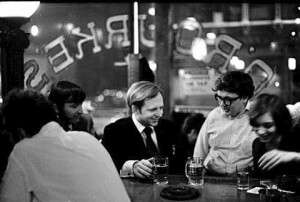 There’s a debate to be had about whether this Sun-Times cover is overly incendiary or whether its tone is or is not befitting the front page of a newspaper. But you could go back and forth on that and neither side would be right or wrong. Meanwhile, the New York Post would be all “How you doin‘?”
There’s a debate to be had about whether this Sun-Times cover is overly incendiary or whether its tone is or is not befitting the front page of a newspaper. But you could go back and forth on that and neither side would be right or wrong. Meanwhile, the New York Post would be all “How you doin‘?”
What’s not really debatable is how factually incorrect this cover is.
The issue comes down to the phrase “Here’s the reason….” It’s essentially saying “This guy did it.” Does current evidence seem to point to him as the culprit? Yep. But he hasn’t been convicted. A newspaper should probably keep its powder dry until that happens.
But even still, it’s false. Let’s say for the sake of argument you as the editor are comfortable saying he did it because of the Facebook post he left and his lawyer essentially admitting he did.
He isn’t the reason the fire happened. A person isn’t a reason. Those are two different things. We don’t yet know what the reason was that he (for argument’s sake) did it. So the word use is poor. Maybe the reason was mental illness. Maybe he was drunk and high on drugs and didn’t have all of his faculties about him. Maybe he was absolutely in his right mind when it happened but had a grudge against someone.* We don’t know yet. The reasoning behind it is still unknown. None of this is revealed by printing his photo.
And not to further split hairs, but the reason the flights were canceled is because the FAA doesn’t have a backup system in place for when the Aurora flight control tower is disabled. Capacity became an issue. The fire was a huge contributing factor, for sure. But it wasn’t the reason. At best it was one of two.
So nevermind the language’s potential consequences or whether he should be treated with kid gloves in copy. The headline, as written, is incorrect. And that’s why it shouldn’t have been printed.
I get why it’s on the cover and even why it was framed around the flight cancellations. It’s a huge story that reminds me of the air traffic controller subplot of “Breaking Bad.” The drama of it is cinematic in scope but affects the way many people lived their lives over the past few days. Contrast this with the current Joliet murder trial that’s grisly and twisted but ultimately doesn’t affect the average person. This story plays well on the front page and has relevance.
But at some point, the front page of a newspaper has to not sound like the boozed-up guy on a barstool at O’Hare who missed his flight to Cleveland.
* Many news outlets have reported that this man was recently told he would be transferred to Hawaii. In the minds of many, this became cause and effect. But this seems like one of those fascinating details that, at first, seems to provide a reason but later turns out to be a McGuffin. Would the move to Hawaii mean he would be separated from family? Did it come with a demotion in title and salary? Does he hate coconuts? There’s so much more to this story but the flash of it seems irresistible.
